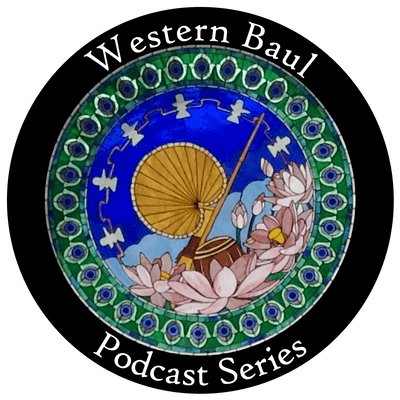
Western Baul Podcast Series
Englisch
Kostenlos bei Podimo
Kostenlos hören bei Podimo
Starte jetzt und verbinde dich mit deinen Lieblingspodcaster*innen
- Vertraut von über 1 Mio. deutschen Hörer*innen
- Über 1.000 lokale Podcasts und Shows – nur bei Podimo
- Keine Zahlung nötig
Mehr Western Baul Podcast Series
The Western Baul Podcast Series features talks by practitioners of the Western Baul path. Topics are intended to offer something of educational, inspirational, and practical value to anyone drawn to the spiritual path. For Western Bauls, practice is not a matter of philosophy but is expressed in everyday affairs, service to others, and music and song. There is the recognition that all spiritual traditions have examples of those who have realized that there is no separate self to substantiate—though one will always exist in form—and that “There is only God” or oneness with creation. Western Bauls, as named by Lee Lozowick (1943-2010), an American spiritual Master who taught in the U.S., Europe, and India and who was known for his radical dharma, humor, and integrity, are kin to the Bauls of Bengal, India, with whom he shared an essential resonance and friendship. Lee’s spiritual lineage includes Yogi Ramsuratkumar and Swami Papa Ramdas. Contact us: westernbaul.org/contact
Alle Folgen
148 FolgenGurdjieff's Aphorisms 3: The Nature of the Path (Carl Grimsman)
Seven of the aphorisms of Gurdjieff are considered in this third talk on the subject. Teaching refers to the ideas we draw from, while the path is our individual road. No two paths are the same, even when they emanate from a common source. The Fourth Way, which the Gurdjieff Work has been called, refers to the premise that we are three-centered beings. The work of the fakir focuses on mastery of the body or moving center, the monk on mastery of the heart or emotional center, and the yogi on mastery of the mind or intellectual center. Each way only encompasses part of the process. The Fourth Way develops all three centers in tandem. We all need cosmology, which describes the structure of the universe. Most traditions are mixes, but we are wise to take care in mixing elements of various teachings before having stabilized on our path. Reasons for finding a path may be different for each of us. Conditions can be fostered for spiritual development, but actual help comes from God. Three practices are discussed: simplicity, super efforts, and working with impressions. We have enough energy to work on ourselves; we only need to save the greater part of what we have. Through experiences calling for extra effort, we open to new levels of being. Only super efforts count. We can hardly advance in our comfort zone. Taking in impressions means taking in the energy that comes with them. An overview of faith, hope, and love from Beelzebub’s Tales is discussed. Self-healing is separate from teaching and yet is a necessary component of the path. Carl Grimsman was born into the Gurdjieff Work environment of the early years of the New York Foundation, attended the children’s group there, and later worked with Mrs. March, a direct Gurdjieff student, at East Hill Farm. The first two books in his “The Soul’s Traverse” series are Sun Bridge and The Kindling.
Rhythm, Ritual & Reverie (Mary Angelon Young)
Rhythm, ritual and reverie are interconnected. They are interwoven in a way that has invoked an experience of the sacred as long as humans have been around. Rhythm gives birth to cycles of becoming and ending. We can align ourselves to existence by paying attention to life's rhythms, which bring us to feel our connection and place in the weave of everything. In ordinary life, rhythm shows up in our routines. These can become portals, sacred doorways which help us to ground and self-regulate. Having a conscious relationship to fluid and creative routines is different than having a collection of mechanical habits that buffer us from reality. Awareness of our state is healing in itself. Ancient people answered big questions of life through communal ritual. The winter solstice is a threshold moment in the rhythm of the year. In times of craziness that come from woundedness, routine and ritual can make a difference. Little practical things can be anchored and ritualized. Rituals are a way we can invoke divine help. When we ask for help, it’s the beginning of laying our burdens down. What burdens do we carry that are not ours to carry? What burdens are we meant to carry? Sometimes we must turn our burdens over to a power that is greater than us. There are three levels of symbols: practical, metaphorical and universal. Sometimes we carry each other when a burden is very great. Through presence we can experience wonder and awe, and court the possibility of reverie. In reverie, we lay our burdens down, open a doorway to revelation, and attune to our deepest Self without effort. Mary Angelon Young is a workshop leader with a background in Jungian psychology, an editor, and author of As It Is, Under the Punnai Tree, The Baul Tradition, Caught in the Beloved’s Petticoats, Enlightened Duality (with Lee Lozowick), The Art of Contemplation, and other books. If you are interested in more on this topic by Mary, visit hohmsahajmandir.org [http://hohmsahajmandir.org/] and click on the Sahaja blog.
Union (Lama Barbara DuBois)
A look into the union of the Two Truths, absolute and relative: the two that are not two. How all appearances and phenomena and all beings are this union, in every instant. How mind of separation, dualistic consciousness, arises with the erroneous conceptualization of “self” or “selfness” in anything, including us…and how this is continuously generating samsara, the realms of wandering in suffering. How any fixation, identity formation and clinging, reactivity, defensiveness, or even slight tension is a sign and signal of this “self”-grasping. And how all of this is suffering—created by mind of separation. How our spiritual work is to love all and to know directly the true nature of being. There is no separation. Lama Barbara Du Bois, PhD, is a longtime teacher in the Tibetan wisdom stream of Buddhdharma, working with students in the United States and Europe. She has for many years been serving as Lopön (Master Dharma Teacher) for the Garchen Buddhist Institute, Western seat of His Eminence Garchen Rinpoche. She is known for her wisdom, clarity, joy, and humor—and for her fierce and tender love. Lama Barbara is the author of Light Years: A Spiritual Memoir; Brave, Generous, & Undefended: Heart Teachings on the 37 Bodhisattva Practices; and Original Innocence (forthcoming).
Eating Impressions: Staying Put in Your Vibratory Atmosphere (Red Hawk)
Most postures are mechanical and are unconsciously accompanied by a mood, which invokes attitude. The Divine feeds on a very fine vibratory energy or food. The Work teaches that there are three being-foods: physical food, air, and impressions. Everything in the world is an energetic configuration vibrating at a certain rate. The lower the vibration the more the appearance of solidity. It is possible to extract finer elements from air, a refined food called prana. Impressions are all energetic phenomena that the senses pick up. When taken in consciously, they serve a crucial function that allows the body to begin the work of creating a higher being-body. The Work teaches that Earth is a school for incomplete beings. We can verify that we are incomplete if we practice self-observation and see that we can’t remember ourselves and drift in and out of consciousness constantly. Gurdjieff wrote about five being-obligations, such as the conscious striving to know more about the laws of creation and world maintenance. The law of reciprocal maintenance is that we are fed and we feed. We are fed by God, and we can feed the Divine with our work on ourselves. Another being-obligation is the striving to pay for our arising and individuality. We pay through intentional suffering. When we see that the ego structure resists manifesting love of God, we begin to consciously suffer and conscience begins to awaken. Change of heart is the only true change. The body is a transformational instrument and everything is food. If we know how to digest, we can find nourishment in everything. We can work up to and through the point of death. Real freedom is freedom from identification. Red Hawk is an acclaimed poet and the author of 13 books, including Self Observation, Self Remembering, The Way of the Wise Woman, Return to the Mother, and Book of Lamentations.
Fun with Self-Hatred (Bandhu Dunham)
Self-hatred is characterized by a critical voice that goes beyond constructive evaluation. It operates visibly and invisibly and can be transmitted between generations. It doesn’t work to try to paste self-love on top of self-hatred. There’s a spiritual idea that the universe, including negative manifestation, exists for God’s entertainment. Forms of self-hatred may involve high achievement, romantic masochism, shyness, imposter syndrome, persistent anxiety, perfectionism, people pleasing, and grandiosity. Origins of self-hatred include emotional neglect and abuse. Addictive behavior regenerates self-hatred. With self-hatred, the three roles of the drama triangle (victim, abuser, rescuer) can show up in one person. Self-hatred takes so much energy that battling with it can seem to be the point of life. In Buddhist psychology, it’s said that we spin our perception of reality into existence and that our natural state is stillness but we get bored with it. Things happen in life that allow the truth of reality to break through. Recognizing self-hatred is key to learning to move beyond it. Self-doubt can kill our impulses so we don’t risk getting hurt again. Every neurotic manifestation has a flip side. Self-hatred can start us on a path of seeing ourselves more clearly. It unravels with self-acceptance. Self-observation is more than just mental analysis; it involves feeling what is going on in the body. In meditation we learn to be present and see ourselves more clearly. Humility and restraint can be upsides of self-hatred. A component of self-hatred is cultural. There is a certain tension that is necessary—a struggle between yes and no—on the path of transformation. Taking a step back, gaining perspective, and humor are helpful in working with self-hatred. Idiocy is part of the human condition. Bandhu Dunham is the author of Creative Life and an internationally recognized glass artist and teacher.















































